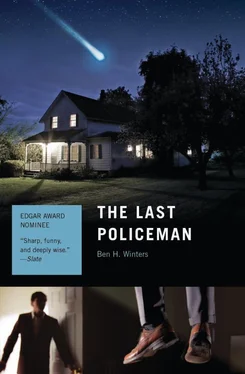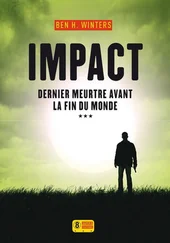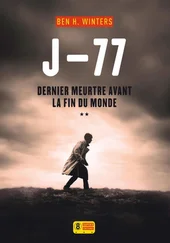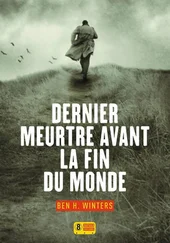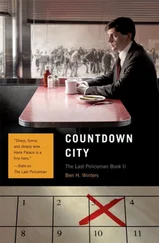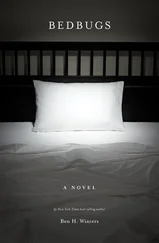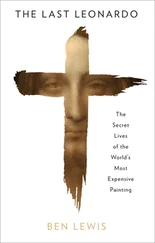“What?”
McConnell writes down where she’s supposed to go and when, where Dr. Fenton will meet her in the morning. There’s a line forming outside the phone booth. The old lady with the wire cart from the hardware store is back, waving her arms at me, like, hello , and behind her is a businessman type in a brown suit, with a briefcase, and a mom with twin girls. I flash my badge through the glass of the phone booth and duck down, trying to arrange myself comfortably in this tiny wooden room.
I raise Detective Culverson on the CB and I tell him that I solved the case.
“You mean, your hanger?”
“Yeah. And your case, too. Eddes.”
“What?”
“Your case, too,” I say. “Same killer.”
I run over the whole thing for him, and then there’s a long pause, radio crackling in the silence, and he says that’s quite a lot of police work I’ve been doing.
“Yeah.”
He says the same thing I said to McConnell last week: “You’re going to be a great detective one day.”
“Yep,” I say. “Right.”
“Are you coming back to headquarters?”
“No,” I say. “Not today.”
“Good,” he says. “Don’t.”
Even in the most quiescent policing environments, there is that occasional violent and random incident, where someone is murdered for no good reason in broad daylight on a busy street or in a parking lot.
The entire Concord Police Department was on hand for my mother’s funeral, and they all rose and stood at attention as the coffin was carried in—fourteen staff members and eighty-six officers in their uniform blues, stiff as statues, saluting. Rebecca Forman, the force’s certified public accountant, a sturdy middle-aged lady with salt-and-pepper hair, seventy-four years old, dissolved into sobs and had to be escorted out. The only person who remained seated was Professor Temple Palace, my father; he sat slackly in his pew throughout the short service, dull-eyed, eyes staring straight ahead, like a man waiting for a bus, his twelve-year-old son and six-year-old daughter standing wide-eyed on either side of him. He sat there, just sort of slumped against my hip, looking more perplexed than grief-stricken, and you could tell right there—I could tell—he wasn’t going to make it.
I am sure that in retrospect what was hard for my father the English professor was not just the simple fact of her death, but the irony: that his wife, who sat from nine to five Monday through Friday behind bulletproof glass in a police station, should be shot through the heart by a thief in the T.J. Maxx parking lot on a Saturday afternoon.
Just to give you a sense of how low the crime rate was in Concord at that time: in the year in question, 1997, according to FBI records, my mother was the only person killed. Which means that, retrospectively, my mother’s odds of falling victim to a murderer in Concord, in that year, came in at one in forty thousand.
But that’s how it works: no matter what the odds of a given event, that one-in-whatever-it-is has to come in at some point, or it wouldn’t be a one-in-whatever chance. It would be zero.
After the wake, my father looked at the kitchen, his glasses sitting on his nose, his eyes large and confused, and said to his children, “Well, now, what are we going to do for dinner?” and he meant not just tonight but forever. I smiled uneasily at Nico. The clock was ticking. He wasn’t going to make it.
Professor Palace slept on the sofa, unable to go up there and deal with the fact of my mother’s absence from the bed, with going through her closet full of things. I did all that. I packed up her dresses.
The other thing I did was hang around the police station a lot, asked the young detective leading the investigation to please let me know how it was going, and Culverson did: he called me when they had analyzed the footprints lifted from the gravel of the T.J. Maxx parking lot; he called when they located the vehicle identified by witnesses, a silver Toyota Tercel subsequently abandoned in Montpelier. When the suspect was in custody, Detective Culverson stopped by the house, laid out the files for me on the kitchen table and walked me through the case, the chain of evidence. He let me see everything except the photographs of the corpse.
“Thank you, sir,” I said to Culverson, my father leaning in the doorway of the kitchen, pale, tired, mumbling “thank you” also. In my memory Culverson says, “Just doing my job,” but I have my doubts whether he really would have said something so cliché. My memory is cloudy—it was a difficult time.
On June 10 of that same year they found my father’s body in his office at St. Anselm’s, where he had hung himself with the window cord.
I should have told Naomi the whole story, about my parents, the truth of it, but I didn’t, and now she’s dead and I never will.
It’s a beautiful morning, and there’s something galling about it, how suddenly, just like that, the winter ends and springtime begins—rivulets of snowmelt and twists of green grass pushing up from under the rapidly thinning layer of snow in the farmland outside my kitchen window. This is going to be trouble, just in terms of law enforcement. It will work like black magic on the public spirit, this new season, the dawn of the last springtime we’re going to get. We can expect a ratcheting up of desperation, fresh waves of anxiety and terror and anticipatory grief.
Fenton said that if she could pull it off, she would call me at nine o’clock with her report. It’s 8:54.
I don’t really need Fenton’s report. Don’t need the confirmation, I mean. I’m right, and I know I’m right. I know that I’ve got it. It’ll help though. It’ll be necessary in court.
I watch one perfect white cloud drift across the blue of the morning, and then, thank God, the phone rings, and I snatch it up and say hello.
No answer. “Fenton?”
There’s a long silence, a rumbling of deep breathing, and I hold my breath. It’s him. It’s the killer. He knows. He’s toying with me. Holy moly.
“Hello?” I say.
“I hope you’re happy, Officer—excuse me, Detective.” There’s a noisy cough, a tinkling noise, ice in a glass of gin, and I look up at the ceiling and exhale.
“Mr. Gompers. This is not a good time.”
“I found the claims,” he says, as if he hadn’t heard me. “The mysterious missing claims you wanted me to find. I found them.”
“Sir.” But he’s not going to stop, and anyway I did tell him he had twenty-four hours, and here he is, reporting in, the poor bastard. I can’t just hang up. “Right,” I say.
“I went to the overnight cabinet, and I pulled that stretch of case numbers. There’s only one in the bunch with Zell’s name on it. That’s what you wanted to know, right?”
“That’s right.”
His voice sloshes with drunken sarcasm. “Hope so. Because it’s all going to happen, just like I said it was. Just like I said.”
I’m looking at the clock. 8:59. What Gompers is telling me doesn’t matter anymore. It never mattered in the first place. This case was never about insurance fraud.
“I’m in the conference room in Boston, digging through the overnights, and who sidles in but Marvin Kessel. Do you know who that is?”
“No, sir. I appreciate your help, Mr. Gompers.”
It was never about insurance fraud. Not even for one second.
“Marvin Kessel, for your information, is the assistant regional manager for the Mid-Atlantic and Northeast regions, and he was awfully interested in what the heck is going on up in Concord. And so now he knows, and now Omaha knows, we’ve got missing files, we’ve got suicides. We’ve got it all!” He sounds like my dad: Because it’s Concord!
Читать дальше
